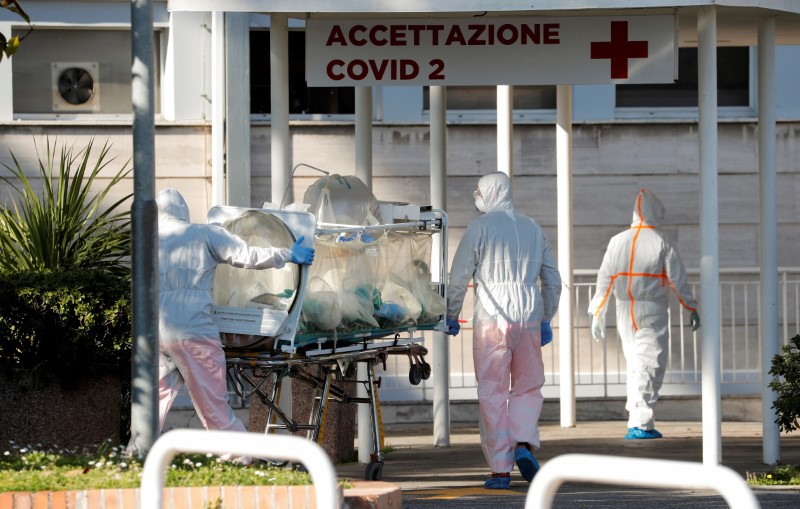By Elvira Pollina and Agnieszka Flak
MILAN (Reuters) - Italian soldiers transported bodies overnight from a northern town whose cemetery has been overwhelmed by the scale of the coronavirus outbreak, as the government in Rome prepared to prolong emergency lockdown measures across Italy.
Video shot by local people in Bergamo, northeast of Milan, and shown on the website of the local newspaper Eco di Bergamo, showed a long column of military trucks driving through the streets overnight and removing coffins from the local cemetery.
An army spokesman confirmed on Thursday that 15 trucks and 50 soldiers had been deployed to move bodies to neighboring provinces. Earlier local authorities in Bergamo had appealed for help with cremations after they had overwhelmed its crematorium.
Italy recorded the largest ever one-day increase in coronavirus deaths on Wednesday as the total rose by 475, including more than 300 deaths in the region of Lombardy, to almost 3,000. In Bergamo, the worst-hit province of Lombardy, the local crematorium has been working 24 hours a day but has been unable to handle the growing numbers of dead.
The images of army trucks evacuating bodies underlined the extent to which health services in the worst-affected northern regions of Italy have been stretched to breaking point by the crisis, which has also seen large numbers of medical personnel falling ill with the virus.
Lombardy regional governor Attilio Fontana said that if significant numbers of doctors and nurses succumbed to the disease, the country risked "disaster".
ECONOMIC DAMAGE
The crisis is also badly damaging Italy's economy, which had already been on the brink of recession before suffering its first case of the virus last month in a small town outside the financial capital Milan. Business then quickly ground to a halt.
The government has unveiled a 25 billion euro ($26.84 billion) package of measures to support companies and workers and sources said it was considering extending guarantees on bank loans to help firms hit by a collapse in orders.
Fears that the crisis could cause a repeat of the debt crisis that hit southern European countries including Italy and threatened the euro itself in 2011 caused borrowing costs to spike sharply in recent days. However financial markets appeared calmer after the European Central Bank announced a 750 billion euro emergency support package overnight.
Italy went into virtual lockdown before other countries in Europe but, with cases still rising, the government is considering even tougher measures that would further restrict the limited amount of outdoor movement currently permitted.
Luca Zaia, governor of the Veneto region neighboring Lombardy, demanded stronger measures from Rome, including closing all shops on Sunday, and said if they were not passed, he would consider passing a regional decree.
"I hope there will soon be measures to restrict people jogging or going out for walks. I'm sorry about that but the alternative is intensive care, hospitalisation and contagion," he said.
On Thursday, the Corriere della Sera newspaper quoted Prime Minister Giuseppe Conte as saying the government would extend the deadline on current emergency measures closing schools and many businesses. The measures currently order most shops to stay shut until at least March 25 and schools till April 3. He did not say how long schools would have to remain closed.
Education Minister Lucia Azzolina told SkyTG24 television that schools would reopen only when there was "certainty of absolute safety", adding that the end of the school year would depend on how well online lessons went in coming weeks.

($1 = 0.9315 euros)